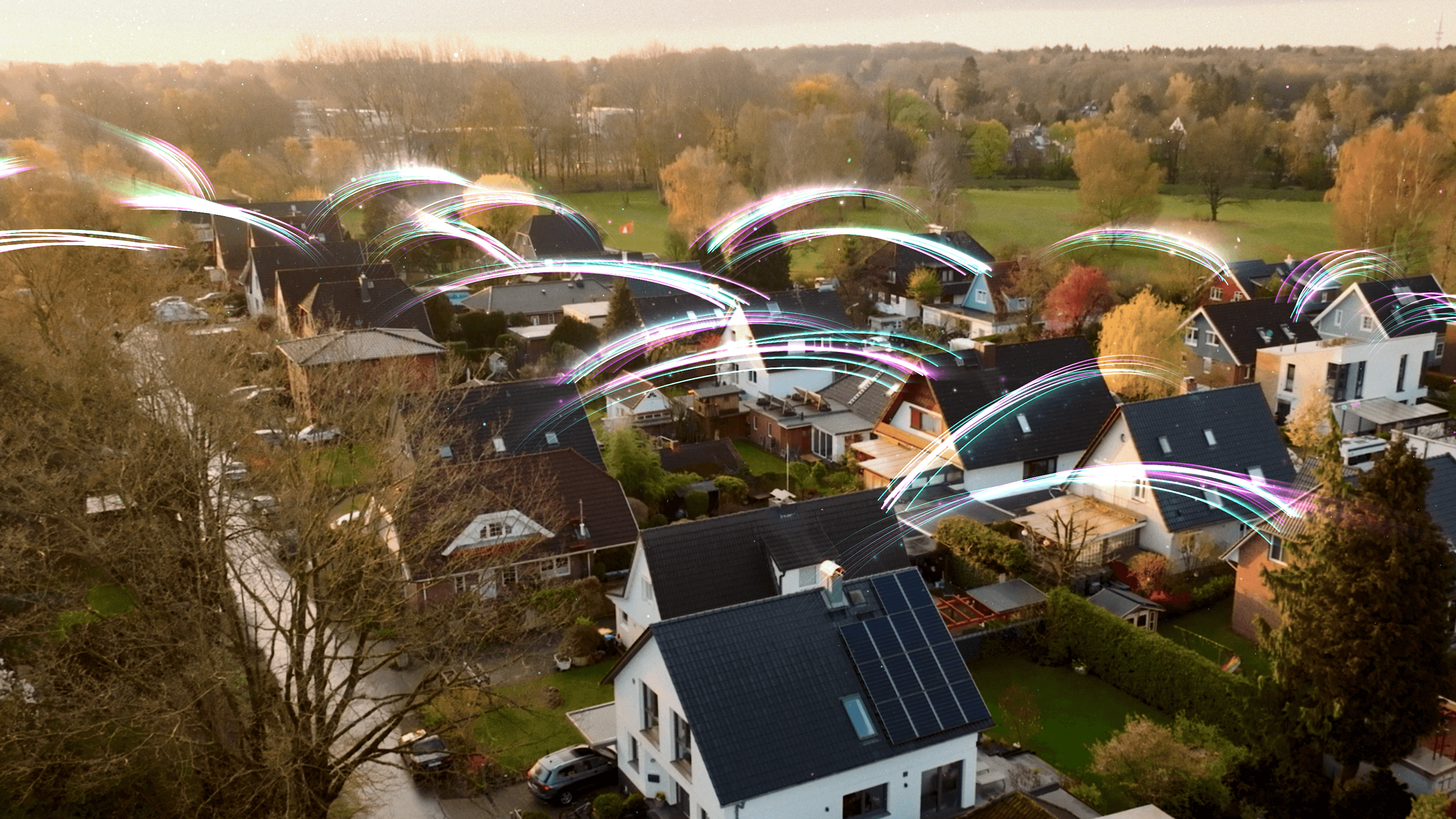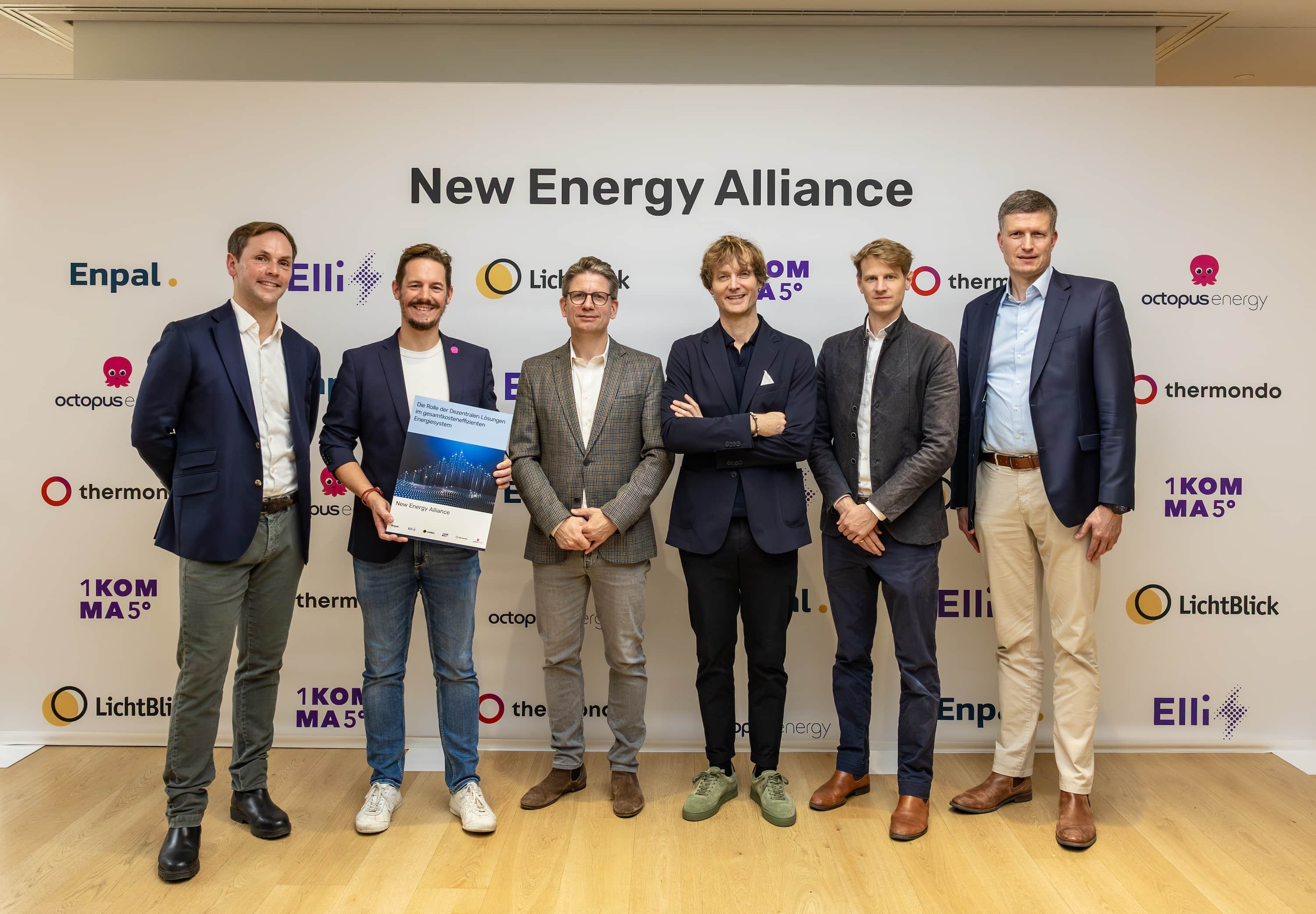

€255 billion in macroeconomic benefits from decentralised energy
Study outlines path to a sustainable, secure and cost-efficient energy system in Germany – Interaction between centralised and decentralised solutions required to achieve overall cost efficiency.
Roland Berger quantifies the added value of decentralised energy solutions: up to 50% energy cost savings for private households and SMEs, 100,000 new jobs and up to 40% reduction in distribution grid expansion by 2045.
New business alliance calls for cost-efficient and demand-oriented design of the energy transition. The initiative includes Octopus Energy, Enpal, 1KOMMA5°, LichtBlick, thermondo and Volkswagen Group Charging (Elli).
Rapid, targeted measures for better integration of decentralised energy solutions are necessary to realise the added value by 2045.
Berlin, Germany – September 30, 2025 – Leading companies in the decentralised energy sector are today presenting a new study commissioned by Enpal from management consultancy Roland Berger. The study outlines the most cost-effective energy mix for Germany and quantifies the specific contribution of decentralised solutions – such as PV battery systems, heat pumps and e-mobility – in combination with large-scale renewable energies and conventional generation.
“Cornerstone”: Decentralised energy solutions in the German energy mix
The study makes it clear that a cost-effective energy transition requires three pillars: the further expansion of renewable energies, the demand-oriented use of backup capacities, and the proactive use of decentralised solutions – including PV battery systems, heat pumps, and electromobility solutions such as EVs and wallboxes. The latter should be given much greater focus as the third pillar of the German energy mix and be consistently integrated.
Roland Berger outlines that decentralised energy solutions could generate economic added value of between €185 billion and €255 billion for the German energy system by 2045. This corresponds to an annual value added of up to 13 billion euros by 2045. This added value results from an increase in the overall cost efficiency of the energy system (including a reduction in necessary investment and running costs), an increase in local value added (including new jobs in the local decentralised energy solutions industry) and direct effects on consumers and SMEs (e.g. through lower energy costs). This makes them not just an optional addition to the energy system, but an urgently needed system upgrade.
50% lower energy costs for households and SMEs
The greatest potential lies with end consumers: decentralised energy solutions are a response to rising energy costs for households and businesses. Overall, savings compared to grid procurement and private investments by households and SMEs could generate 120 to 160 billion euros in additional value added. For households, this means average annual savings of up to €1,200. With decentralised energy solutions, prosumers are becoming so-called flexumers: they not only consume and generate electricity, but also respond flexibly to price signals, thus making an active contribution to grid stability that benefits the system.
"Decentralised energy solutions offer many advantages. They make an important contribution to a cost-efficient energy system that is less dependent on fossil fuels. The study shows that decentralised energy solutions in particular offer untapped potential for significantly reducing the costs of the energy transition. We already have a leading industry in Germany – if we set the right course now, we can make a real difference in the coming years," says Marc Sauthoff, Senior Partner Civil Economics, Energy & Utilities at Roland Berger.
Political mandate: level playing field for renewables and conventional energy sources
Clear political framework conditions are needed to ensure that the enormous value added by decentralised solutions can actually be leveraged. More than 20 leading companies in the field of decentralised energy solutions are therefore calling for the energy transition to be designed in a cost-efficient and demand-oriented manner – in other words, for decentralised energy solutions to be given equal consideration in the German energy system. With concrete recommendations for action to policymakers, the companies are showing how the economic potential of decentralised energy solutions can be exploited by 2045. This includes the consistent expansion of renewable energies, a system-friendly adjustment of grid fees, the digitalisation of the energy market, the promotion of decentralised solutions, the accelerated expansion of smart grids and the introduction of bidirectional charging. In this way, decentralised flexibility can become a central component of German and European energy sovereignty.
The newly founded initiative includes leading providers in the field of decentralised energy solutions: 1KOMMA5°, Enpal, LichtBlick, Octopus Energy, thermondo and Volkswagen Group Charging (Elli), as well as Bosch, E3DC, enercity, energy partners, gridX, Maxx Solar, metiundo, Ostrom, polarstern, Rabot Energy, Solar Manager, sonnen, SPiNE, techem, The Mobility House Energy, Tibber and Vonovia.

Philipp Schröder, CEO 1KOMMA5°, Bastian Gierull, CEO Octopus Energy, Felix Plog, CEO Thermondo, Giovanni Palazzo CEO Volkswagen Group Charging, Benjamin Merle-Oberheide, CPO Enpal, Marc Wallraff, CEO Lichtblick
The study results at a glance:
A total of €185-255 billion in added value can be generated – an added value of up to €13 billion per year by 2045. The annual added value potential of decentralised solutions thus corresponds to approximately 50% of the annual budget of the Climate and Transformation Fund (approximately €25 billion in 2025).
The savings potential of intelligently integrated decentralised solutions in grid investments amounts to up to approximately 1.4 billion euros per year by 2045, representing 40-50% of the expansion investments planned by grid operators at the low-voltage level.
The total CAPEX savings potential from decentralised solutions of approximately 1-2 billion euros per year corresponds to around 50-70% of the German government's special fund earmarked for energy infrastructure until 2029.
Decentralised solutions can reduce flexibility costs – understood as redispatch costs – by approximately 40%. This corresponds to around 80-100 euros/MWh for decentralised solutions compared to 130-150 euros/MWh for conventional supply and reserve power plants.
Decentralised solutions will create approximately 100,000 jobs by 2045 – that is approximately 5,000 jobs per year. This corresponds to a cumulative increase of over 30% measured against the current figure of approximately 280,000 jobs in renewable energies according to the Federal Environment Agency in 2023.
In the best-case scenario, private households and SMEs can reduce their energy costs by around 50% on average: for private households, this results in annual savings of around 900-1,200€ with an average consumption of 4,000 kWh/year and costs of approximately 40p/kWh. For SMEs, this represents a potential saving of around €1,500-2,500 per year with an average consumption of 15,000 kWh/year and costs of approx. 18 cents/kWh.
Philipp Schröder, CEO & Co-Founder of 1KOMMA5°: "Decentralised solutions and New Energy massively reduce infrastructure costs and our geopolitical dependence. The key is to intelligently combine generation and consumption. For gas, this means: first activate all flexibility! Anyone planning a rigid electricity grid today, without flexibility and intelligent control, needs more residual load and drives up grid expansion costs. The general public bears the costs for this. If, on the other hand, we use flexibility, the price of electricity for everyone will fall immediately. The solutions are there – now we have to get started on implementation."
The full study is available at the following link: www.new-energy-alliance.de
About 1KOMMA5°
1KOMMA5° is a leading provider for CO2-neutral energy, heat and mobility. Founded in Hamburg, Germany, in 2021, the company operates around 80 locations worldwide, serving as the one-stop shop for intelligent, integrated energy solutions such as photovoltaics, electricity storage, heat pumps, air conditioning and charging stations. Its core technology is the artificial intelligence Heartbeat AI; it currently optimizes more than 50,000 systems, creating Europe's largest virtual power plant that connects private customers with the energy market and controls electricity generation and sales in time with the wind and sun. 1KOMMA5° has already installed over 300,000 decentralized, controllable energy systems. By 2030, the company aims to convert more than 1.5 million buildings to a climate-friendly energy supply, thus contributing to achieving the Paris climate targets.
